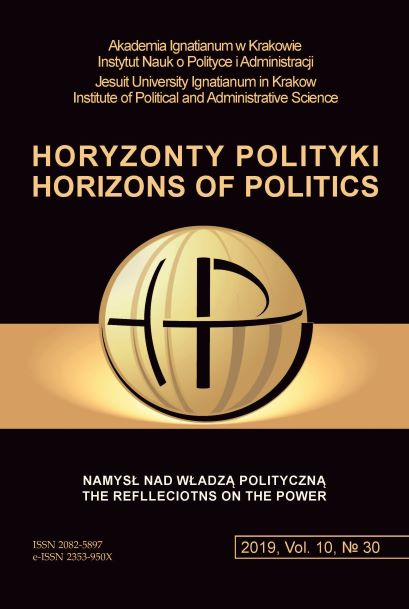The Marriage from the Perspective of Political Philosophy
The Marriage from the Perspective of Political Philosophy
Author(s): Piotr ŚwierczSubject(s): Theatre, Dance, Performing Arts, Political Philosophy, Polish Literature, Family and social welfare
Published by: Uniwersytet Ignatianum w Krakowie
Keywords: Witold Gombrowicz; Cogito; political philosophy; the play The Marriage; political power;
Summary/Abstract: RESEARCH OBJECTIVE: The aim of this article is an analysis of Witold Gombrowicz’s play The Marriage from the perspective of political philosophy. THE RESEARCH PROBLEM AND METHODS: The main problem undertaken in the article is an analysis of the play Marriage within the context of the main themes present in Witold Gombrowicz’s work, i.e. the problem of “pure form,” the relationship between the Fatherland and the Sonland, and the Inter- human Church. The article is based on an analysis of Gombrowicz source texts (The Marriage, A Guide to Philosophy, Diaries), conducted within the context of the abovementioned themes in his thought. THE PROCESS OF ARGUMENTATION: The text begins with a justification of the author’s attempt at analyzing The Marriage from the perspective of political philosophy. Achieving this goal requires a synthetic grasp of the problems of political philosophy, culminating in a working definition of the latter. Next, the main themes in W. Gombrowicz’s work are subjected to a synthetic and concise analysis. Finally, it is within this context that the main goal of the article is undertaken – an analysis of the play The Marriage from the perspective of political philosophy. RESEARCH RESULTS: The main result of the scientific analysis conducted in the article is the formulation of a consistent interpretation of W. Gombrowicz’s play The Marriage from the perspective of political philosophy. Three out of four of the main themes in Gombrowicz’s work are considered in this interpretation. The theme of the “facilitated life” was purposely left out of the analysis. The entire analysis is presented against the backdrop of the Cartesian notion of Cogito, which also serves as the background for all of Gombrowicz’s work. CONCLUSIONS, INNOVATIONS, AND RECOMMENDATIONS: in his conclusions, the author indicates various interpretive possibilities for the key issues undertaken in the article (the relationship between Fatherland and Sonland, among others), thus creating a starting point for further research into both political (or meta-political) issues and the question of Gombrowicz’s position in reference to the archetype of Polish political culture.
Journal: Horyzonty Polityki
- Issue Year: 10/2019
- Issue No: 30
- Page Range: 39-64
- Page Count: 26
- Language: English

